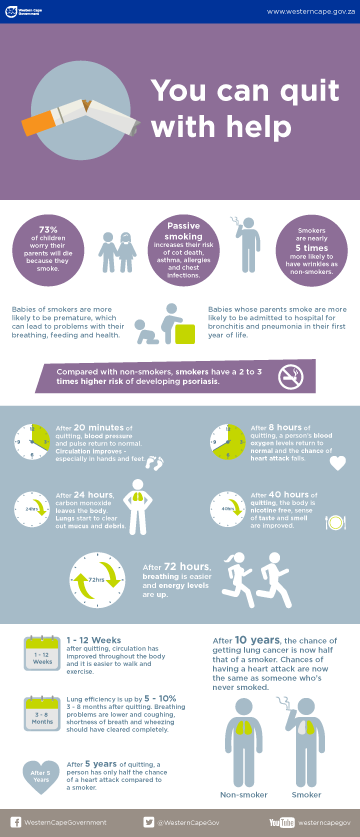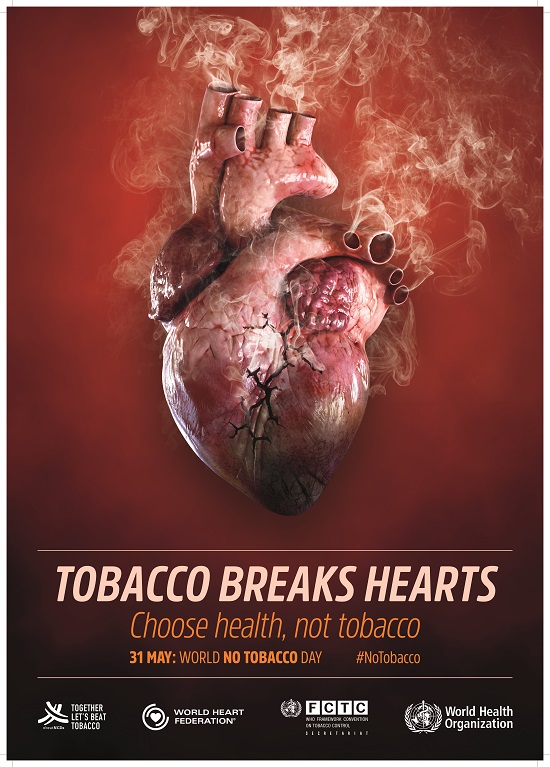Tobacco and your health
 Although the health risks of tobacco are well known, an estimated 7 million people still die worldwide from tobacco-related diseases every year. Close to 900 000 of these deaths are non-smokers dying from second-hand smoke inhalation. It's estimated that more than 44 000 South Africans die as a result of tobacco-related diseases.
Although the health risks of tobacco are well known, an estimated 7 million people still die worldwide from tobacco-related diseases every year. Close to 900 000 of these deaths are non-smokers dying from second-hand smoke inhalation. It's estimated that more than 44 000 South Africans die as a result of tobacco-related diseases.
Tobacco is highly addictive, can affect your health, negatively impact second-hand smokers and damage our environment.
It has led to an ongoing campaign in our country that aims to bring down tobacco related deaths by:
- discouraging young people from smoking,
- encouraging smokers to quit,
- educating everyone on the dangers of smoking, and
- raising awareness of the harmful effects of second-hand smoke.
Health risks of tobacco use
Before you light up your next cigarette, consider the health risks associated with using tobacco. Tobacco use can lead to:
- Cancer
- Stroke
- Heart disease
- Addiction
- Loss of taste and smell
You’re also putting your loved ones at risk as they inhale toxic chemicals such as carbon monoxide and arsenic.
Second-hand smoke
Second-hand smoke also known as environmental tobacco smoke (ETS), is most commonly referred to as passive smoking, is when a non-smoker inhales the cigarette smoke of a smoker.
The Cancer Association of South Africa (CANSA) says that a non-smoker sitting in a room filled with smoke for 8 hours will breathe as many cancer-causing chemicals as if he or she had smoked 36 cigarettes.
The dangers of second-hand smoke for children
Second-hand smoke is extremely dangerous for children because it can cause respiratory diseases such as asthma, ear and chest infections. Babies who breathe in smoke are exposed to a higher risk of Sudden Infant Death Syndrome (SIDS), also known as cot death.
Avoiding second-hand smoke
Follow these guidelines in order to avoid second-hand smoke:
- Make your home, workplace and community smoke-free.
- Ask smokers not to smoke around you.
- Don't allow smokers to smoke around your children.
- Ask visitors not to smoke in your home.
- If you live with smokers, set up a place outside where they can smoke or help them quit.
Key messages
To commemorate World No Tobacco Day, the Western Cape Department of Health has highlighted key messages to raise awareness about tobacco use:
- Tobacco is the leading cause of death and illness.
- Tobacco is a killer.
- Second-hand smoke poses a greater health hazard to non-smokers.
- Tobacco users need help to quit.
- Health warnings and pictures work.
- Bans on tobacco advertising lower tobacco use.
- Taxes discourage tobacco use.
Practice safe smoking
As a smoker, make sure you know where you’re allowed to smoke and where you’re not allowed to smoke. The Cancer Association of South Africa (CANSA) has outlined laws from the Tobacco Products Control Amendment Act (2007/2008):
- You’re not allowed to smoke in a car when children under the age of 12 years are present.
- You’re not allowed to smoke at a property such as a crèche where there are young children or at a school where children are being educated.
- You can't take a child under the age of 18 years to a place where smoking is allowed.
- You’re not allowed to smoke in a partially enclosed public place such as a balcony, veranda, covered patio, a walkway or a parking area.
- You’ll have to pay the maximum fine of R50 000 if you’re the owner of a place such as restaurant, bar or workplace that has broken the law and if you’re an individual smoker, you’ll have to pay a fine of R500.
- You can’t sell cigarettes to children under the age of 18 nor can children under the age of 18 be allowed to sell cigarettes to you.
What to do if you see someone smoking in a non-designated area
 As a non-smoker, you’re entitled to your rights not to allow a smoker to smoke in front of you, the Cancer Association of South Africa (CANSA) provides you with rights you have if you see someone smoking in a place where smoking isn’t allowed:
As a non-smoker, you’re entitled to your rights not to allow a smoker to smoke in front of you, the Cancer Association of South Africa (CANSA) provides you with rights you have if you see someone smoking in a place where smoking isn’t allowed:
- You can ask the supervisor or manager of the area where smoking isn’t allowed, to speak to the person.
- If you find that the supervisor or manager refuses to help you or they allow the smoking to take place on the premises, you’re allowed to take the matter further.
- When you go and lodge a complaint, make sure you take an image of the smoker. Try to include one feature that’ll make it easier to identify the place where the prohibited smoking occurs.
- You’ll need to go to the Environmental Health Officer to lodge the complaint as they have the power to deal with your complaint under the Criminal Offences Act.
Getting help
Kicking bad habits on your own isn't always easy. There are organisations that are ready to help you quit using tobacco.
You can get help from:
CANSA eKick Butt Programme
Tel: 0800 22 66 22 (toll-free)
Email: info@ekickbutt.org.za
Draft Control of Tobacco Products and Electronic Delivery Systems Bill, 2018
The draft bill is intended to replace the 1993 Tobacco Control Act and ensure that the South African legislation is in line with the World Health Organisation's Framework Convention on Tobacco Control. It will introduce tougher tobacco restrictions and regulate the use of electronic cigarettes.
The bill will address the following areas:
- smoking in indoor public areas,
- the display of tobacco products sale points,
- the use of electronic devices (e-cigarettes),
- the introduction of plain packaging of tobacco products, and
- to provide control over smoking;
How does it affect smokers and those who vape?
- It will regulate the sale and advertising of tobacco products and e-cigarettes.
- Regulation of the packaging and appearance of tobacco products and e-cigarettes and to provide a way to standardise packaging.
- It will provide standards for the manufacturing and export of tobacco products and e-cigarettes.
- It will prohibit the sale of tobacco products and e-cigarettes to and by persons under the age of 18 years.
- It will prohibit the free distribution of tobacco products and e-cigarettes.
- It will prohibit the sale of tobacco products and e-cigarettes by means of vending machines.
Commenting on the Draft Control of Tobacco Products and Electronic Delivery Systems Bill, 2018
You are invited to comment on the new draft bill and the closing date for comments is on 9 August 2018.
You can submit your comments or representations on the proposed Bill to:
The Director-General of Health
Private Bag X828
Pretoria
0001
(Attention: Chief Director: Health Promotion, Nutrition, Oral Health and Food Control, Ms Lynn Moen-Mahalngu)
or
Email: lynn.moeng@health.gov.za
World No Tobacco Day 2018
The aim of World No Tobacco Day on 31 May, is to raise awareness about the harmful effects of tobacco. It’s also an opportunity to encourage users to stop using tobacco.
This year, the day is celebrated under the theme "Tobacco Breaks Hearts." The World Health Organisation (WHO) wants to focus on the impact that tobacco has on the cardiovascular health of people worldwide. There is a direct link and a risk factor for smokers to develop coronary heart disease, stroke and peripheral vascular disease.
Read more about "Tobacco and heart disease".



